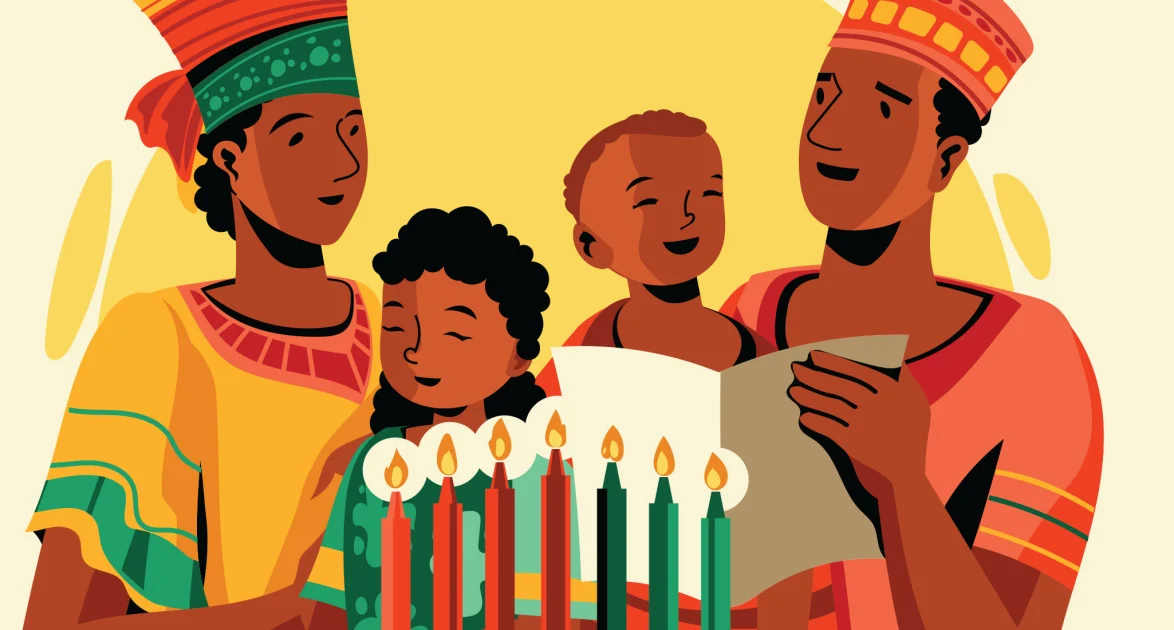What is Kwanzaa?
Kwanzaa is a week-long holiday that is observed by many African Americans and people of African descent around the world. It is typically celebrated from December 26th to January 1st each year and is meant to honor African cultural and historical traditions.
What does the word Kwanzaa mean?
The word "Kwanzaa" comes from the phrase "matunda ya kwanza," which means "first fruits" in Swahili. The holiday is meant to celebrate the first harvests of the year, as well as the African cultural and historical traditions that have been passed down through the generations.
How is Kwanzaa celebrated?
Kwanzaa is typically celebrated with a series of rituals and traditions, such as lighting candles, decorating with traditional African symbols and colors, and participating in cultural activities such as music, dance, and storytelling. It is also common for families to come together for feasts and to exchange gifts with one another.
What are the Nguzo Saba?
The 7 principles of Kwanzaa, known as the Nguzo Saba (7 Principles), are a central part of the holiday and are meant to serve as guiding principles for African Americans throughout the year. There are seven principles in total, including umoja (unity), kujichagulia (self-determination), ujima (collective work and responsibility), ujamaa (cooperative economics), nia (purpose), kuumba (creativity), and imani (faith).
What is the history of Kwanzaa?
Kwanzaa was created in 1966 by Dr. Maulana Karenga, a professor of Africana Studies at California State University. It was meant to be a way for African Americans to celebrate and honor their cultural and historical traditions, particularly in the aftermath of the civil rights movement.
Is Kwanzaa a religious holiday?
Kwanzaa is not a religious holiday, but it is spiritual in nature. It is meant to be a time for reflection and celebration of African cultural and historical traditions, and many people who celebrate Kwanzaa may incorporate spiritual or religious elements into their celebrations.
Is Kwanzaa celebrated by people of all races?
Kwanzaa is primarily celebrated by African Americans and people of African descent, but it is not exclusive to any particular racial or ethnic group. People of all races and backgrounds are welcome to participate in and learn about the holiday and its traditions.
Is Kwanzaa an alternative to Christmas?
Kwanzaa is not meant to be an alternative to Christmas or any other holiday, but rather a way for African Americans and people of African descent to celebrate and honor their cultural and historical traditions. Many people who celebrate Kwanzaa may also celebrate Christmas or other holidays.
Do people exchange gifts during Kwanzaa?
Yes, it is common for people to exchange gifts with one another during Kwanzaa. These gifts are often handmade or culturally significant items that reflect the values and traditions of the holiday.
How do people decorate for Kwanzaa?
There are several traditional symbols and colors associated with Kwanzaa, which are often used to decorate homes and other spaces during the holiday. These include a Kinara (candle holder), Mkeka (mat), Mazao (crops), Muhindi (corn), and Zawadi (gifts). The colors of Kwanzaa are red, green, and black, which represent the blood of African ancestors, the
What is the significance of the Kinara (candle holder) during Kwanzaa?
The Kinara is a central part of Kwanzaa celebrations and is used to hold seven candles, one for each of the seven principles of Kwanzaa. The candles are lit in a specific order, with one candle being lit each day of the holiday.
What is the significance of the Mkeka (mat) during Kwanzaa?
The Mkeka is a straw mat that is used during Kwanzaa celebrations as a symbol of African culture and tradition. It is placed under the Kinara (candle holder) and serves as a reminder of the foundation on which the holiday is built.
What is the significance of the Mazao (crops) during Kwanzaa?
The Mazao, or crops, are a central part of Kwanzaa celebrations and are used to represent the importance of agriculture and the first harvests of the year. They are often displayed along with the Kinara (candle holder) and the Mkeka (mat) during the holiday.
What is the significance of the Muhindi (corn) during Kwanzaa?
The Muhindi, or corn, is a symbol of fertility, abundance, and the potential for growth. It is often displayed during Kwanzaa celebrations as a reminder of the importance of these values.
What is the significance of the Zawadi (gifts) during Kwanzaa?
The Zawadi, or gifts, are an important part of Kwanzaa celebrations. They are often handmade or culturally significant items that are given to friends and family as a way of showing appreciation and love.
What is the significance of the red, green, and black colors during Kwanzaa?
The colors of Kwanzaa, red, green, and black, are symbolic of African culture and history. Red represents the blood of African ancestors, green represents the land and the potential for growth, and black represents the people of African descent.
How do people celebrate Kwanzaa in different parts of the world?
Kwanzaa is celebrated by people of African descent around the world, and the way in which the holiday is observed may vary depending on the region or country. In some places, Kwanzaa may be celebrated with traditional African music and dance, while in others it may be more focused on cultural education and discussion.
How long has Kwanzaa been celebrated?
Kwanzaa was first created in 1966 by Dr. Maulana Karenga, a professor of Africana Studies at California State University. It has been celebrated annually since its inception and has grown in popularity over the years.
Is Kwanzaa a national holiday in the United States?
Kwanzaa is not a national holiday in the United States, but it is widely observed by many African Americans and people of African descent. It is not a replacement for any other holiday, but rather a way for people to celebrate and honor their cultural and historical traditions.





